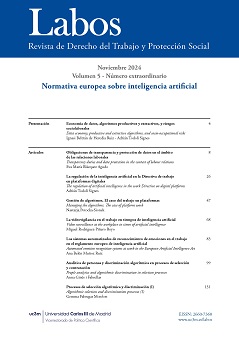Managing the algorithms. The case of platform work
Abstract
The paper provides an analysis of the firstever EU instrument to regulate automated monitoring and automated decisionmaking in the work context, i.e., the Directive on Improving Working Conditions in Platform Work (the Platform Work Directive). The legal provisions on algorithmic management contained in this instrument merit detailed scrutiny. Not only are they widely considered to be the most progressive and well-designed set of the Directive’s provisions but also a testbed for further regulation that would address algorithmic management practices in traditional workplaces, beyond the platform work context. The article analyses the relevant provisions laid down in Charter III of the Platform Work Directive, paying particular attention to the intricate way of drawing their personal and material scope. The current regulation of automated monitoring and decision-making in that Directive is contextualised against the provisions of the original Proposal put forth by the EU Commission, as well as other relevant legal instruments, such as the General Data Protection Regulation. The article posits that despite noticeable advancements in the protection of people performing platform work against algorithmic risks, some critical aspects remain unaddressed.
Downloads
Copyright (c) 2024 LABOS Revista de Derecho del Trabajo y Protección Social

This work is licensed under a Creative Commons Attribution-NonCommercial-NoDerivatives 4.0 International License.
Loa autores ceden a la Revista Labos los derechos de reproducción y distribución, así como cualquier forma de explotación del trabajo.




